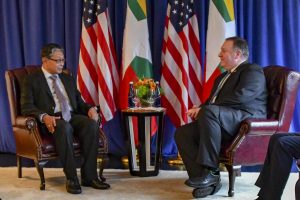The eyes of the international community are on the United States following the Order of 23 January 2020 made by the International Court of Justice regarding the case of The Gambia v. Myanmar in which the Republic of the Union of Myanmar is ordered to protect their ethnic Rohingya minority against genocide. Myanmar’s Ministry of Foreign Affairs responded declaring that the case, which saw a panel of 17 judges vote unanimously in making the ruling, was a “distorted picture of the situation.”
The United States has been cautious in its word choice and rhetoric on the situation for the Rohingya in Myanmar’s Rakhine state bordering Bangladesh, but as various reports surmounted the national debate over recent years, direct government actions, financial aid, and propositions grew stronger. The recent ICJ ruling should provoke a response by the United States, which is carefully navigating support for the Rohingya while maintaining a positive relationship with Myanmar as it battles China for influence over the Southeast Asian nation.
The United States has previously imposed targeted sanctions on two Myanmar army units and four military and police commanders. In 2018, U.S. Treasury Under Secretary for Terrorism and Financial Intelligence Sigal Mandelker, using the U.S. government’s preferred name for Myanmar, stated that “Burmese security forces have engaged in violent campaigns against ethnic minority communities across Burma, including ethnic cleansing, massacres, sexual assault, extrajudicial killings, and other serious human rights abuses.” This move notably avoided calling the activity in the Rakhine against the Rohingya a genocide and the sanctions did not target top levels of leadership within Myanmar’s military.
While the United States has condemned Myanmar’s military campaigns against the Rohingya, the State Department and the Treasury Department have had disputes on an appropriate response to events in Rakhine state. In 2018, the Treasury Department argued against sanctioning multiple Myanmar officials. Treasury officials believed that such sanctions would not have much impact, as those sanctioned had few assets within the United States or elsewhere that would be effected. The State Department argued that financial punishment is secondary to the primary goal of sending a message that those named are “bad actors.” The conflict represented overall disunity and hesitation in Washington toward how to appropriately address the pressing situation of Rohingya killings.
U.S. rhetoric intensified after the release of various in-depth reports throughout 2018 indicating systematic and organized targeting of the Rohingya ethnic group in Rakhine state. In August 2018, the State Department released a report that documented atrocities in the northern region of Rakhine state. For the report, data was systematically collected on “events that refugees encamped in Bangladesh has witnessed in their northern Rakhine State villages.” The report concluded that “three-quarters witnessed a killing by a member of the army” and “victims named the army as perpetrators in an overwhelming majority (88%) of the killings witnessed, as well as in nearly all armed ground assaults (92%) and aerial attacks (88%).”
In September 2018, the Public International Law and Policy Group (PILPG) released its factual findings report. The group’s Paul Williams exclaimed that “it is clear from our intense legal review that there is, in fact, a legal basis to conclude that the Rohingya were victims of war crimes, crimes against humanity, and genocide.” The findings of these reports, among others, likely fueled the strong rhetoric by U.S. Vice President Mike Pence against Rohingya persecution on the sidelines of the 2018 Association of Southeast Asian Nations (ASEAN) summit in Singapore, in which he stated to Myanmar leader Aung San Suu Kyi that he was “anxious to hear about the progress that you’re making, holding those accountable who are responsible for the violence that displaced so many hundreds of thousands and created such suffering, including loss of life.” Such rhetoric indicated increased pressure on Myanmar to address the atrocities being committed against the Rohingya. In July of 2019, the United States announced sanctions against the commander-in-chief of the Myanmar military, Min Aung Hlaing, among other leaders, for atrocities committed against the Rohingya.
On the legislative side, the U.S. Congress has made continuous efforts to address and aid the persecuted Rohingya. Notably, in December of 2019, the Further Consolidated Appropriations Act of 2020, signed into law by Trump, stated that “not less than $2,000,000 shall be made available for such programs for the Rohingya community in Bangladesh.” The inclusion and passage of such aid marks the direction of U.S. policy toward Myanmar and the Rohingya. The road to this direct assistance was paved by various bills and resolutions passed in the U.S. House of Representatives that signified attention to the pressing issue, such as the Burma Unified through Rigorous Military Accountability Act of 2019, which directly addressed the U.S. policy of acknowledging atrocities committed against the Rohingya, imposition of sanctions for the violation of human rights, and the authorization to provide humanitarian assistance.
As time passes, the foreign policy of the United States is moving toward protecting and aiding the Rohingya as well as condemning the inaction of Myanmar’s government in protecting them. The Unisted States has displayed periods of strife and restraint in an attempt to sustain positive relations with Myanmar, lest China enjoy unchecked influence over the Southeast Asian nation. But the International Court of Justice’s Order of 23 January 2020 could serve as the catalyst for a new firm and substantial response from the United States in condemnation of the atrocities committed against the Rohingya in Myanmar’s Rakhine state.
Adam Kiedrowski is an independent writer, researcher, and political analyst.

































